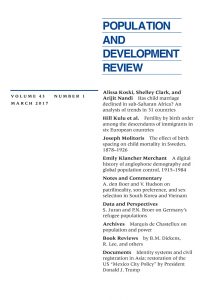The New Faces of Welfare: Overcoming the Stigma of State Assistance
 Despite last week’s promising government figures showing a decline in the American unemployment rate, “Welfare and Citizenship: The Effects of Government Assistance on Young Adults’ Civic Participation,” serves as a reminder to social scientists that with every great social shift (such as the global economic downturn) we must re-examine our premises. The article, which relies heavily on data collected between 1996 and 2000, argues that declining civic participation can be causally linked to welfare participation. The authors echoed the concern that, “[d]eclinging voter turnout rates, an increase in single-issue, self-interested politics, and a retreat from associational ties and community involvement, among other trends, have signaled to many the weakening of American democracy.” This decline, they postulate, can be attributed, in part, to social assistance programs that bear stigma.
Despite last week’s promising government figures showing a decline in the American unemployment rate, “Welfare and Citizenship: The Effects of Government Assistance on Young Adults’ Civic Participation,” serves as a reminder to social scientists that with every great social shift (such as the global economic downturn) we must re-examine our premises. The article, which relies heavily on data collected between 1996 and 2000, argues that declining civic participation can be causally linked to welfare participation. The authors echoed the concern that, “[d]eclinging voter turnout rates, an increase in single-issue, self-interested politics, and a retreat from associational ties and community involvement, among other trends, have signaled to many the weakening of American democracy.” This decline, they postulate, can be attributed, in part, to social assistance programs that bear stigma.
The article differentiates two tiers of state benefit programs. The first tier, “including social insurance benefits such as unemployment insurance, social security, and Medicare,” are thought to be universal entitlements with little or no stigma attached. The second tier, “including welfare and other supports for the poor such as general assistance and food stamps” are discretionary- causing the full citizenship of recipients to be called into question. The article hypothesizes that, despite the best intentions of scholars such as Marshall and Tocqueville, the “contemporary welfare state reduces active citizenship,” resulting in “lower political engagement among those who have participated in government assistance… [with] stronger effects among those receiving more stigmatizing welfare benefits (eg AFDC, food stamps) but weaker or no effects for those who receive less stigmatizing ‘first tier’ forms of government assistance.”
While the article recognizes the work of other theorists who attribute this low voter turnout to pre-existing characteristics already associated with low voter turnout including poverty, education, and age, the article maintains that the resulting disaffection is related to social stigma and the self-perception of only quasi citizenship. The authors cite Habermas’ argument that, “contemporary states managed by large bureaucratic apparatuses and dense laws may actually promote passive client citizenship.” The article concludes that in addition to designing social assistance programs that promote more active citizenship, policy makers must design a social assistance program that can overcome the more stigmatizing attributes of schemes like that of the food stamp program.
It will not be social policy, however, that makes the first step to overcoming the stigma of welfare programs. The New York Times published a feature on November 29 that took an in depth look at the social safety net in the past year. According to the report, food stamp use is currently at a record high. More than 36 million people are participating in the program; one in eight Americans and one in four children. This growing group is not comprised solely of single mothers and the chronically poor but also married couples, the newly jobless and workers whose hours have been significantly reduced.
While the number of those receiving assistance is on the rise, still only-two thirds of those eligible participate. According to Kevin Cancannon, an under secretary of agriculture, “This is the most urgent time for our feeding programs in our lifetime, with the exception of the Depression. It’s time for us to face up to the fact that in this country of plenty, there are hungry people.” The article also demonstrates that much of stigma surrounding “second tier” welfare programs is perpetuated by politicians and government representatives. In the 1990s, when some sought to abolish the food stamp program or “nutritional aid,” “Congress enacted large cuts and bureaucratic hurdles.” The same bureaucratic hurdles that Habermas warned would encourage passive citizenship.
The Times article explains that in cities and counties across the States, “old disdain for the program has collided with new needs” and “use has grown by half or more in dozens of suburban counties from Boston to Seattle, including such bulwarks of modern conservatism as California’s Orange County, where the rolls are up more than 50 percent.” It seems that the face of the welfare recipient is changing rapidly and drastically as millions of Americans find themselves in unanticipated hardship. This shift leads one to wonder if, as recovery continues and recipient rolls begin to decline again, this lapse in harsh stigma will be more than temporary. If nothing else it provides a window for the program’s proponents to create reform, including encouraging civic participation, without quite as thick cloud of doubt and disdain.
![]() Read the article in the New York Times
Read the article in the New York Times
![]() Read “Welfare and Citizenship: The Effects of Government Assistance on Young Adults’ Civic Participation” by Teresa Toguchi Swartz, Amy Blackstone, Christopher Uggen and Heather McLaughlin
Read “Welfare and Citizenship: The Effects of Government Assistance on Young Adults’ Civic Participation” by Teresa Toguchi Swartz, Amy Blackstone, Christopher Uggen and Heather McLaughlin


















I think it was one of Reagen’s aids who said it best–unemployment should be miserable in order to encourage someone to get a job and hold onto it. Reform is needed for both welfare and unemployment to encourage people to stand on their own feet. Everyone needs help occasionally and with the generous supply of charitable organizations out there ready and willing to help, our own government should not encourage the unemployment rate by making it easier to get unemployment or welfare. It is only logical that if welfare and unemployment are easy to keep for years on end as is the case in some cities, then employment will continue to go down and government spending will continue to rise.
This is an interesting , well-written article. There are so many sides to these programs that seek to help people who need it that is is hard to draw any definite conclusions about the people who receive help. Some companies who look down on people they employ that use food stamps are unwilling to pay those same people a better wage so they don’t qualify for or need food stamps. People who have never been hungry should not be so quick to judge people who need and use food stamps. There is abuse in every program and always will be because of human nature but that does not mean that the programs should be done away with. People who are burdened with just surviving do not have the time and resources and sometimes good health to be as involved in their civic participation as someone who may be more economically blessed. Bernie Madoff robbed investors of more than 21 billion dollars, where is the outrage over that by the American Public? Some of his victims are probably in need of food stamps now. Our government needs to study the lives of people who need help in order to help the next generation to avoid some of the mistakes that may have led to their dependence on help. And I guarantee you, some of the mistakes were made by people in power over the people who needed help. In my opinion, higher education should be free to those students who have good grades and want to further their education, not just available to those who have the money to go. In the long run, better educated or trained citizens, is going to help everyone by reducing the need for help. I believe everyone that can, should raise a garden and at least have fresh vegetables through the summer months and reduce their dependence on store bought food. You can buy seed with food stamps. Don’t look down or judge people who get help. Thank God for your blessings if you don’t need help and remember the Bible says, “Pride goes before a fall.”
I used to work as a government official. Govt is still too political, paid and bought for, and intentionally disorganized for the general public to trust it. The govt “welfare” low tax credit allocation program that distributes federal monies to the states to owners of apartment properties is an example. Like a Three Stooges comedy, it is difficult to figure who is in charge of compliance between HUD, the IRS, and the states. On purpose. http://www.not-hud-compliant.spaces.live.com, http://www.hudincomeexclusions.wordpress.com.
Sounds just like what the Nation Wreckers want to see — dependent little people of the State instead of real Americans who have had quite enough of NWO ambitions. We’ll see how long this bull lasts before White America turns the tables in a big, BIG WAY.
The timing of the gathering of data here is quite interesting…not long after TANF, but long enough that it might have begun to influence the culture and the way we regard welfare recipients.
Some of the comments here suggest that there is still stigma against welfare recipients, but if this is softening it would be a great change for the country as a whole as well as the individuals who require assistance.
Simmel also recognizes the importance of framing assistance, so that it is regarded as for the good of society as a whole, not just for the good of the recipients. This is what happened for the banking industry last fall, but we still don’t look at welfare policies in this fashion.
Keri